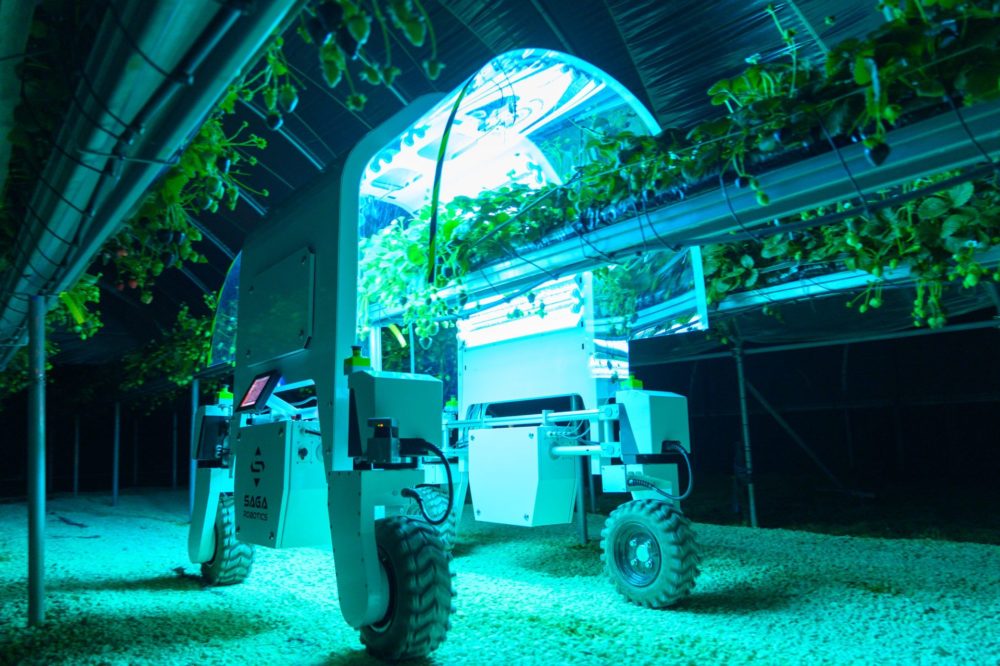Saga Robotics, a UK and Norwegian startup developing fleets of autonomous strawberry pickers and agri-robots that blast fungus with UV light, has just raised €9.5 million ($11.3 million).
The funding round saw participation from three major European investors: Norwegian sovereign climate investment company Nysnø (formerly known as Fornybar); London-based private equity investor ADM Capital via its food and ag-focused Cibus Enterprise Fund; and Rabo Food & Agri Innovation Fund, an early-stage investment arm of the Dutch financial services giant Rabobank.
These big three were also joined by a smaller Norwegian boutique – Propagator Ventures.
Speaking to AFN, Nysnø investment manager John Egil Johannessen said his team had been impressed with Saga’s adaptive approach to machine learning and getting round rural connectivity bottlenecks.
The startup’s technology “shows us a promising future where artificially intelligent and precise machines use less resources to achieve higher yield,” added the firm’s CEO Siri Kalvig.
For ADM’s head of VC investments Alastair Cooper, Covid-19 has — despite its clear and disastrous impacts elsewhere — somewhat improved the investment outlook for agri-robotics.
“The Covid-19 pandemic has accelerated the need to advance the use of robotics in agriculture, as technology will play an increasing part in reducing labour risk in the harvesting process,” he said in a statement.
“Saga’s robots improve sustainability in farming by reducing soil compression, CO2 emissions, and production losses due to mildew. Using precision farming technology, Saga reduces pesticide and fungicide use and increases plant yields. With quality data applications we will start to see greater actionable intelligence provided to farmers.”
Speaking to AFN, Saga’s UK chief operating officer Halvard Grimstad described how the “low hanging fruit” ahead for the company is to get more of its robots out into the field with reliable navigation systems suitable for all conditions. He said the plan was to focus on a ‘robotics-as-a-service’ business model, rather than simply selling hardware to farmers.
Grimstad also gave an update on an Innovate UK grant the company had won earlier in the year. Here, Saga is leading a project called ‘Robot Highways’ from its office in Lincoln, where it’s aiming to perform what Innovate UK describes as “the largest known global demonstration of robotics and autonomous technologies on a farm.” The subject robots are tasked with assisting farmers by carrying out essential, energy-intensive physical processes, such as picking and packing fruit and treating crops.
An ongoing debate among agri-robotics companies like Saga is whether a robot should be a specialist or an all-rounder — tasks like weeding, spraying, crop mapping, logistical support, or harvesting all vary widely. With this in mind, some robo startups have sought out a niche within a niche – like Israel’s Greeneye, which is focusing on weed detection.
Niches can be just as rewarding as broad applicability; sometimes more so. The robotic harvesting sector alone was worth an estimated $5.5 billion in 2018, based on interest from early adopters. Investor interest in this particular area has already shown strong growth. Examples include Root AI, which recently raised funds from AgFunder, Jason Calacanis, and others [disclaimer: AgFunder is AFN’s parent company]. Others are Denver-based Tortuga AgTech, which came out of stealth in January, and California’s Advanced.Farm – both of which offer robotic strawberry harvesters. Closer to Saga, geographically speaking, are startups like the UK’s Small Robot Company, which has a penchant for ambitious crowdfunding and has recently expanded into Brazil; or France’s Naïo Technologies, which raised a $17 million round at the start of this year.





